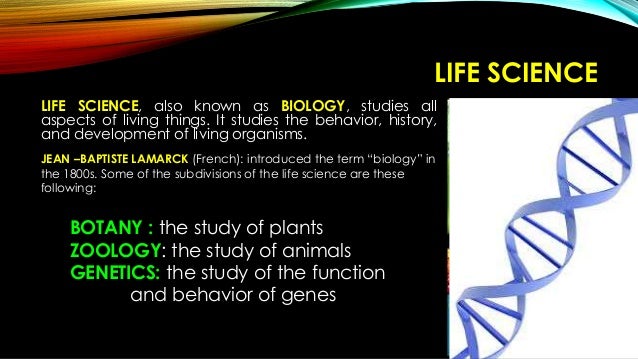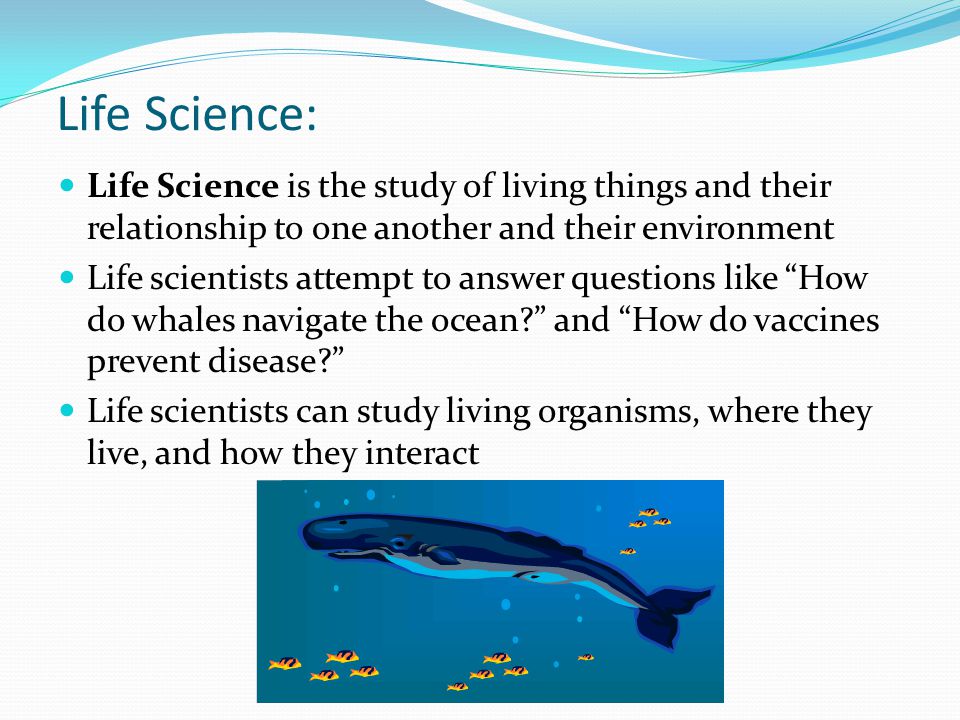What is the branch of science that deals with the study of living things
Microbiology is the study of all living organisms that are too small to be visible to the naked eye. Human Biology: Human biology is the branch of biology that deals with human beings and human populations. Human biology is related to other fields of biology such as medicine, primate biology, and biological anthropology. The science and study of bacteria and their relation to medicine and to other areas such as agriculture e. Virology is the study of viruses and virus-like agents, including but not limited to their taxonomy, disease-producing properties, cultivation and genetics.
It is often considered a part of microbiology or pathology. Mycology is the branch of biology that deals with the study of fungi. It includes the research of their genetic and biochemical properties and their use in medicine and food along with their hazards. Entomology is a branch of zoology that studies insects and how they interact with their environment, other species and humans.
The study of structure and function of plant and animal cells. Embryology is the study of the development of an embryo from the stage of ovum fertilization through to the fetal stage. Taxonomy or Systematics: The science of identifying, naming, grouping and classifying plants and animals is called taxonomy or systematics. Genetics is a branch of a biology that deals with heredity and variations. Parasites are those organisms that live on or inside other organism called the host and draw nourishment from the host are called parasites.
The study of parasites is called parasitology. It includes the study of three major groups of animals: It is a branch of biology which studies diseases in plant and animals and their treatment. The immune system protects us from infection through various lines of defense. Immunology is the study of the immune system.
Navigation menu
Thus it is a science which aims to improve the human race through controlled heredity. It is a branch of biology which deals with raising crops and live stocks such as cows, buffaloes, etc.
Veterinary Science: Marine Biology: Marine biology is the study of marine organisms, their behaviours, and interactions with the environment. Horticulture is the science and art of producing, improving, marketing, and using fruits, vegetables, flowers, and ornamental plants. Animal Husbandry: It includes day-to-day care, selective breeding and the raising of livestock like cows, buffaloes etc.
Sericulture, or silk farming, is the rearing of silkworms for the production of raw silk. The breeding, rearing, and transplantation of fish by artificial means is called pisciculture. Tissue Culture: Molecular Biology: The field of molecular biology overlaps with biology and chemistry and in particular, genetics and biochemistry. Meteorology is the interdisciplinary scientific study of the atmosphere. Studies in the field stretch back millennia, though significant progress in meteorology did not occur until the 17th century.
The 19th century saw breakthroughs occur after observing networks developed across several countries. After the development of the computer in the latter half of the 20th century, breakthroughs in weather forecasting were achieved. Space science or Astronomy is the study of everything in outer space.
The science of living things comprises the branches of science [19] that involve the scientific study of living organisms, like plants, animals, and human beings. However, the study of behavior of organisms, such as practiced in ethology and psychology, is only included in as much as it involves a clearly biological aspect. While biology remains the centerpiece of the science of living things, technological advances in molecular biology and biotechnology have led to a burgeoning of specializations and new, often interdisciplinary, fields.
- The Major Branches of Science.
- what are the best deals on cell phones!
- largess iftar deals 2019;
- The study of science that deals with living things is called;
- The Branches of Science!
- What is Biology?!
Biology is the branch of natural science concerned with the study of life and living organisms , including their structure, function, growth, origin, evolution, distribution, and taxonomy. Some branches of zoology include: Human biology is an interdisciplinary academic field of biology, biological anthropology, nutrition and medicine which focuses on humans; it is closely related to primate biology, and a number of other fields.
Some branches of biology include: Botany, plant science, or plant biology is a branch of biology that involves the scientific study of plant life. Botany covers a wide range of scientific disciplines including structure, growth, reproduction, metabolism, development, diseases, chemical properties, and evolutionary relationships among taxonomic groups.
Botany began with early human efforts to identify edible, medicinal and poisonous plants, making it one of the oldest sciences. Today botanists study over , species of living organisms. The social sciences are the fields of scholarship that study society. These include: The formal sciences are the branches of science that are concerned with formal systems , such as logic , mathematics , theoretical computer science , information theory , systems theory , decision theory , statistics , and theoretical linguistics. Unlike other sciences, the formal sciences are not concerned with the validity of theories based on observations in the real world empirical knowledge , but rather with the properties of formal systems based on definitions and rules.
Methods of the formal sciences are, however, essential to the construction and testing of scientific models dealing with observable reality, [23] and major advances in formal sciences have often enabled major advances in the empirical sciences. Decision theory in economics, psychology, philosophy, mathematics, and statistics is concerned with identifying the values, uncertainties and other issues relevant in a given decision, its rationality, and the resulting optimal decision.
It is very closely related to the field of game law. Logic is used in most intellectual activities, but is studied primarily in the disciplines of philosophy , mathematics , semantics , and computer science. Logic examines general forms which arguments may take, which forms are valid, and which are fallacies. In philosophy, the study of logic figures in most major areas: In mathematics and computer science, it is the study of valid inferences within some formal language.
Mathematics , first of all known as The Science of numbers which is classified in Arithmetic and Algebra, is classified as a formal science, [27] [28] has both similarities and differences with the empirical sciences the natural and social sciences. It is similar to empirical sciences in that it involves an objective, careful and systematic study of an area of knowledge; it is different because of its method of verifying its knowledge, using a priori rather than empirical methods.
Statistics is the study of the collection, organization, and interpretation of data. A statistician is someone who is particularly well versed in the ways of thinking necessary for the successful application of statistical analysis. Such people have often gained this experience through working in any of a wide number of fields. There is also a discipline called mathematical statistics , which is concerned with the theoretical basis of the subject.
The word statistics , when referring to the scientific discipline, is singular, as in "Statistics is an art. Systems theory is the interdisciplinary study of systems in general, with the goal of elucidating principles that can be applied to all types of systems in all fields of research. The term does not yet have a well-established, precise meaning, but systems theory can reasonably be considered a specialization of systems thinking and a generalization of systems science.
In this context the word systems is used to refer specifically to self-regulating systems, i. Self-regulating systems are found in nature, including the physiological systems of our body, in local and global ecosystems, and in climate.
The branches of science, also referred to as sciences, "scientific fields", or " scientific disciplines," are commonly divided into three major groups: Formal sciences: the study of mathematics and logic, which use an a priori, . Biology is the branch of natural science concerned with the study of life and living organisms. Science is a systematic enterprise that builds and organizes knowledge in the form of testable explanations and predictions about the universe. Modern science is typically divided into three major branches that consist of the natural sciences ( e.g. biology, chemistry, physics), which study There is disagreement, however, on the formal sciences being a science as.
Theoretical computer science TCS is a division or subset of general computer science and focuses on more abstract or mathematical aspects of computing. These divisions and subsets include analysis of algorithms and formal semantics of programming languages. Technically, there are hundreds of divisions and subsets besides these two. Each of the multiple parts have their own individual personal leaders of popularity and there are many associations and professional social groups and publications of distinction.

Applied science is the application of scientific knowledge transferred into a physical environment. Examples include testing a theoretical model through the use of formal science or solving a practical problem through the use of natural science. Applied science differs from fundamental science , which seeks to describe the most basic objects and forces, having less emphasis on practical applications.
Applied science can be like biological science and physical science. Fields of engineering are closely related to applied sciences. Applied science is important for technology development. From Wikipedia, the free encyclopedia. Further information: Formal logic Mathematics. Game theory Decision theory. Actuarial science Information theory Systems theory Control theory.

Physics Classical Modern Applied. Theoretical Experimental Computational. Mechanics classical analytical continuum fluid solid.
Framework of understanding
Electromagnetism Thermodynamics. Molecular Atomic Nuclear Particle. Condensed matter Plasma. Special relativity General relativity. Inorganic Organic Analytical Physical. Artificial intelligence Bioethics Bioinformatics Biostatistics Cognitive science Complex systems Computational linguistics Cultural studies Cybernetics Environmental science Environmental social science Environmental studies Ethnic studies Evolutionary psychology.
Forensics Forestry Library science. Philosophy History. Glossaries of science and engineering. Main articles: Natural science and Outline of natural science. Physical science and Outline of physical science. Physics and Outline of physics. Chemistry and Outline of chemistry. Earth science and Outline of earth science. Ecology and Outline of ecology.
ASK A BRAND
Main article: Geology and Outline of geology. Meteorology and Outline of meteorology. Space Science and Outline of space science. Life science and Outline of life sciences. Biology and Outline of biology. Zoology and Outline of zoology.
- harcourt outlines coupon code!
- Branches of Biology.
- arbraska coupon rabais.
- cell c tablet deals april 2019.
- Email Newsletter.
- Branches of Biology - Biology-Online Dictionary | Biology-Online Dictionary.
Human biology. Botany and Outline of botany. Social sciences and Outline of social science. Formal sciences and Outline of formal science. Decision theory.